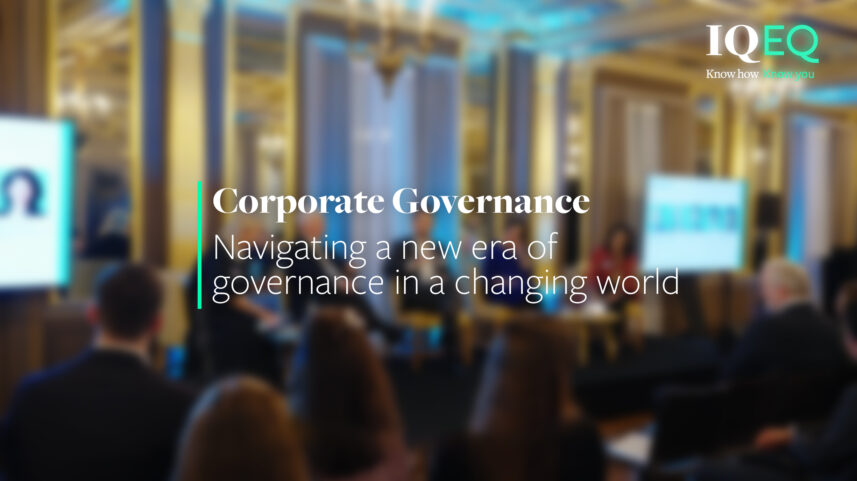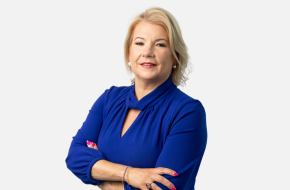Geopolitical tension, rapid technological advancement, and rising demands around accountability and sustainability were key themes to emerge from IQ-EQ’s latest corporate governance event, which brought together industry experts and clients to examine how boards must adapt in a time of structural, technological and cultural transformation.
Dr Chris Pierce, CEO of Global Governance Services, opened his keynote speech with the question: “When will the first robot become a company director?” His answer – that it has already happened – set the tone for the later panel discussion. Governance, he argued, is evolving faster than many realise, and leaders must ensure innovation strengthens rather than destabilises their organisations. With studies showing that well-governed companies are 20-30% more profitable than poorly governed ones, the stakes are clear.
Hosted by Joanne McEnteggart, IQ-EQ’s Global Head of Debt, Capital Markets, and Corporate, the subsequent panel featured Dr Chris along with Luke Varley, General Counsel at Park Square Capital; Vicky Kubitscheck, Independent Chair, NED, Board Advisor and Author; and Lisa Scott, NED and Corporate Governance Specialist.
The evolution of diversity: beyond the checkbox
Joanne opened the panel with the reflection that diversity and inclusion remain central concerns to modern governance, but that the conversation is shifting.
Rather than just a “check the box” directive, Lisa noted growing demand for diversity on boards, with businesses seeing the value in “diversity of thought.” However, the success of such efforts remains uneven: Women in Boards research reports that only 13% of Chairs, CEOs, SIDs and CFOs are women, and just 1% are women of colour. “I see the intention is there,” she said, “but the practice isn’t following.”

Vicky highlighted enduring barriers for women, especially around maternity and flexible working. While these practices have improved access to leadership roles, she emphasised that the pipeline remains a challenge.
Chris noted the significant gains nonetheless achieved over the last decade, with no all-male boards in the FTSE350, and 43% of board members being women. “Boards are increasingly moving away from the ‘old boys’ club’,” he noted, with concerns around gender balance accelerating the professionalisation of board selection. In particular, with executive search firms now involved not just for senior management roles but for the board itself, a more transparent and merit-based process is becoming increasingly standardised. Still, the panel agreed, the “glass ceiling” is proving resistant to shattering entirely.
Technology: balancing innovation and integrity
In his keynote speech, Chris framed technology as “a disruptor and enabler,” forcing boards to rethink how accountability and oversight can coexist with the relentless pace of innovation.
Luke explored this tension through the lens of fiduciary responsibility. He noted that while AI can enhance efficiency and insight, its use must always align with the best interests of investors. Managing expectations, he said, requires balance: clients don’t expect firms to “type a deal into ChatGPT” for quick answers, but they do expect them to use every available tool responsibly, and with an eye on value and cost discipline.

One of the most practical applications of AI, the panel agreed, lies in streamlining administrative processes. However, wholesale adoption was cautioned against, with poor implementation easily leading to compliance breaches or the mishandling of sensitive data. Culture emerged as a central factor in responsible adoption. Vicky summarised that businesses must “take the hype out of AI” and focus on realistic, value-driven use cases. Luke added that unfamiliarity often breeds fear: the more boards understand how AI truly works, the more effectively and safely they can use it.
The question of sustainability
Opinions remained diverse on the role of sustainability and ESG in the governance agenda.
The panel agreed that ESG remains a priority to nearly every board, yet the huge variance in structures, priorities and approaches hinders effective decision-making. Chris suggested the issue is linked to widespread fragmentation: “There are around 400 different ESG frameworks worldwide, which is about 390 too many.” Consolidation emerged as a crucial factor to reduce confusion in the marketplace and make mandates more effective.
Vicky emphasised the need for leadership clarity. “How do you help investors make informed choices when the labels keep changing?” she asked, citing the failure of AI regulation to keep pace with innovation as a clear example of how regulatory lag amplifies uncertainty and risk. In such an environment, boards must look to define their own principles and set risk appetite from the top down, ensuring that decisions reflect both investor expectations and long-term resilience.
NEDs: the gravel in the oyster
The discussion closed with a focus on non-executive directors (NEDs) and their evolving role in shaping culture and accountability. Acting as the “gravel in the oyster,” Chris framed the NED as a catalytic grit that challenges processes in order to refine them.
“I see my role as getting the balance right between support and challenge,” agreed Lisa, who is an NED herself. Culture is at the heart of the dynamic: “My default position is to support, but I also need to ask those difficult questions in a respectful way.” Ultimately, she explained, it’s crucial that those with problems feel NEDs are geared to solve them, not assign blame.
Luke welcomed the idea of NEDs asking these questions, viewing challenge as necessary to maximise value add. “I want to be challenged in the boardroom,” he emphasised, noting that rigorous questioning from NEDs helps executive teams stress-test decisions and uncover blind spots that might otherwise go unnoticed.
Chris also highlighted the increasing demands on NEDs, both in terms of time commitment and preparation. For listed companies, being a NED increasingly requires around 40 to 50 days a year; a considerable demand considering his “3:1 rule,” which outlines that every hour in a board meeting requires three hours of preparation.
The panel agreed that effective NEDs must cultivate trust beyond the boardroom. As Lisa summarised, “relationships are built outside the boardroom,” and when problems arise, those relationships are what make the difference.
Governance in transition
As organisations navigate an increasingly complex global environment, governance must balance dual responsibilities: keeping pace with technological and societal change while remaining firmly rooted in principles of integrity, accountability and fiduciary duty. Across these themes, culture consistently emerged as the defining factor, shaping how boards approach issues such as diversity, ESG and AI. Ultimately, a culture that encourages constructive challenge, the “gravel in the oyster,” provides the foundation for effective oversight and long-term growth.
From the boardroom to implementation, discover how our global entity management services can turn governance into a strategic advantage.
Watch our event highlights reel







